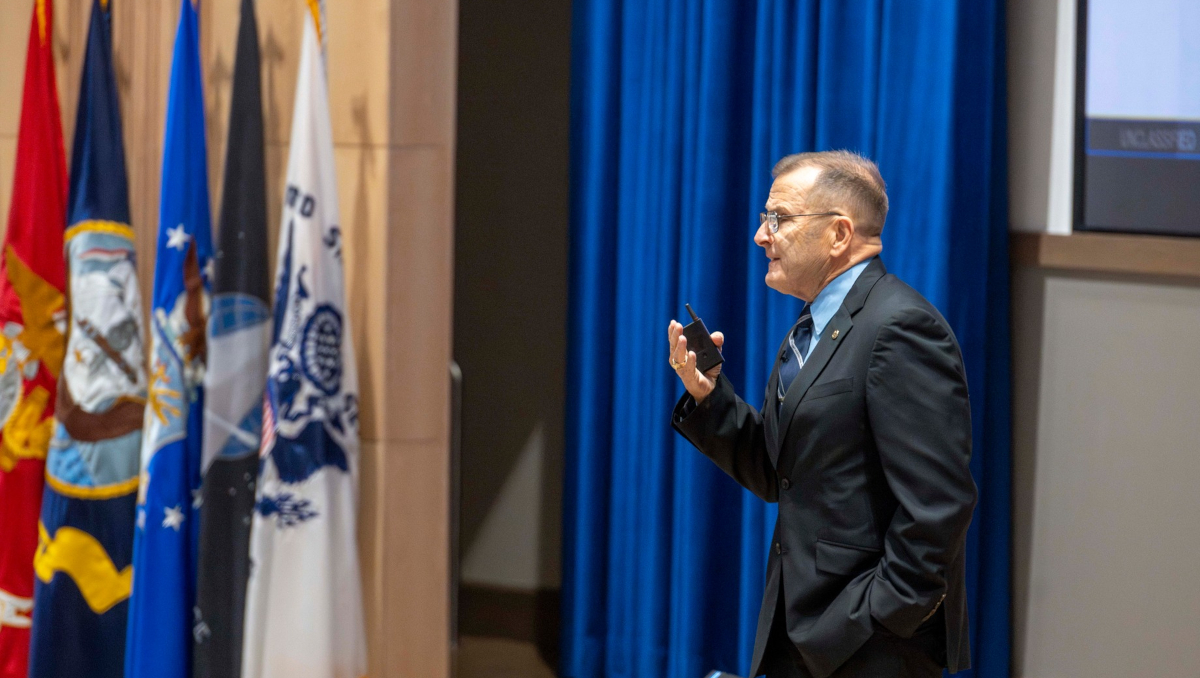
The U.S. Army War College (USAWC) recently hosted its 2025 Homeland Defense Symposium, gathering experts to tackle the complex issues of defending the homeland. A key focus was clarifying the difference between Homeland Security (law enforcement and emergency response) and Homeland Defense (military protection against external threats). Bert Tussing, Director of the Homeland Defense and Security Issues Group at the USAWC’s Center for Strategic Leadership, joined host Ron Granieri in the studio to discuss the major themes of the symposium. Participants emphasized the importance of preparedness, highlighting that future conflicts are likely to reach U.S. soil. The discussions emphasized the need for a whole-of-society approach, integrating not just federal agencies but also state and local governments, the private sector, and the general public into defense strategies.
The term homeland defense may be unfamiliar to many listeners more accustomed to the phrase Homeland Security. These differences are significant even if the policies are intended to be complementary.
Podcast: Download
Bert Tussing is Director of the Homeland Defense and Security Issues Group at the U.S. Army War College’s Center for Strategic Leadership (CSL). He joined CSL in October 1999, following nearly 25 years in the United States Marine Corps. He is a distinguished graduate of both the Marine Corps Command and Staff College and the Naval War College and holds master’s degrees in National Security Strategy and Military Strategic Studies. In May of 2014 he was awarded an honorary doctorate in Humane Letters by Northwestern State University in recognition of his work in Homeland Security, Homeland Defense and Educational initiatives surrounding those topics.
Ron Granieri is Professor of History and the Chair of the Department of National Security and Strategy at the U.S. Army War College and the Editor of A BETTER PEACE.
The views expressed in this presentation are those of the speakers and do not necessarily reflect those of the U.S. Army War College, U.S. Army, or Department of Defense.
Photo Description: A fervent advocate for issues of homeland defense and security, Professor Bert Tussing, Director of the Homeland Defense and Security Issues Group at the U.S. Army War College’s Center for Strategic Leadership, recently gave a lecture titled “Evolving Direction of Homeland Defense” to the USAWC class of 2025.
Photo Credit: U.S. Army War College





Thank you for this valuable information. This discussion is critical for leaders to hear. As a fire emergency medical services leader your statement on preparation for capability and capacity of local resources is imperative. Challenging leaders to think the unthinkable must be a standard conversation question. Keep up the solid work.
We’re delighted that you liked the podcast!
Is the need/the necessity — for such things as homeland security and homeland defense — is this such need/necessity vastly diminished; this, if the population of an entity (exs: the population of the USSR at the end of the Cold War and/or the population of the U.S. at the end of the post-Cold War) voluntarily/of their own volition (a) choose to abandon critical aspects of their own way of life, their own way of governance, their own values, their own institutions, etc., (and, thus, abandon critical aspects of their foundational ideas relating to same) and, in the place of these (b) adopt critical aspects of the ways of life, the ways of government, the values, the institutions, etc., of their opponents/their competitors/their enemies (and, thus, adopt critical aspects of the foundational ideas relating to same)?
In this regard, was not the need/the necessity — for such things as homeland security and/or homeland defense — was this such need/necessity vastly diminished; this, when the population of the USSR, at the end of the Cold War, made these exact such types of choices/decisions?
(Or, in cases such as these, does the need/the necessity, for such things as homeland security and homeland defense, does this depend more the expected benevolence — or lack thereof — of the victor?)
Note that, at the end of the Cold War, the population of Russia chose to document their abandonment/adoption decisions, such as I discuss above; this, in such things as the 1990 Charter of Paris for a New Europe and in their new constitution of 1993. (And, thereby, vastly reduced their need to do such things as homeland security and/or homeland defense?)
In this regard, is the population of the U.S., now at the end of the post-Cold War, likely to consider something similar? (And, thereby, vastly reduce our need to to do such things as homeland security and/or homeland defense?)
(Note that, from the perspective that I present here, a “whole of society” approach, to standing hard against our opponents/our competitors/our enemies today — and/or doing such things as bolstering our homeland security and homeland defense in relation to same — this would only seem to be possible [and/or necessary?]; this, if the population of the U.S., now at the end of the post-Cold War, refused to follow the abandonment/adoption path that I describe above?)